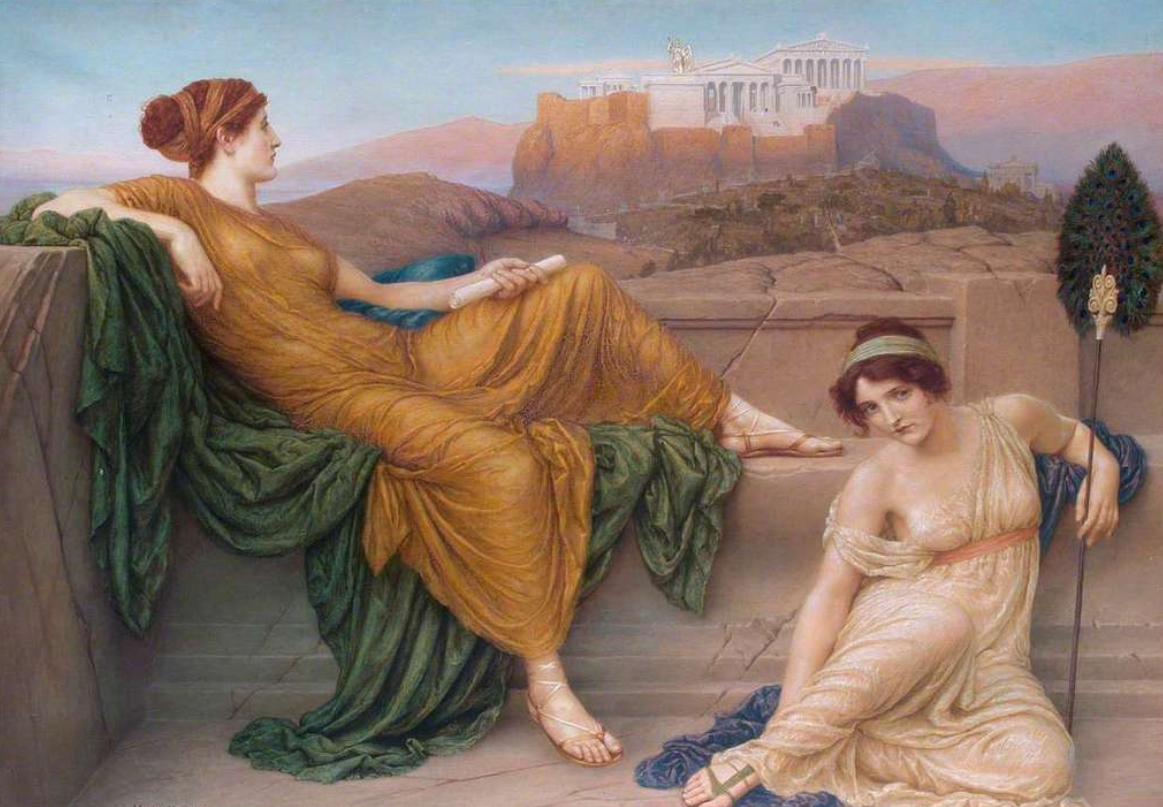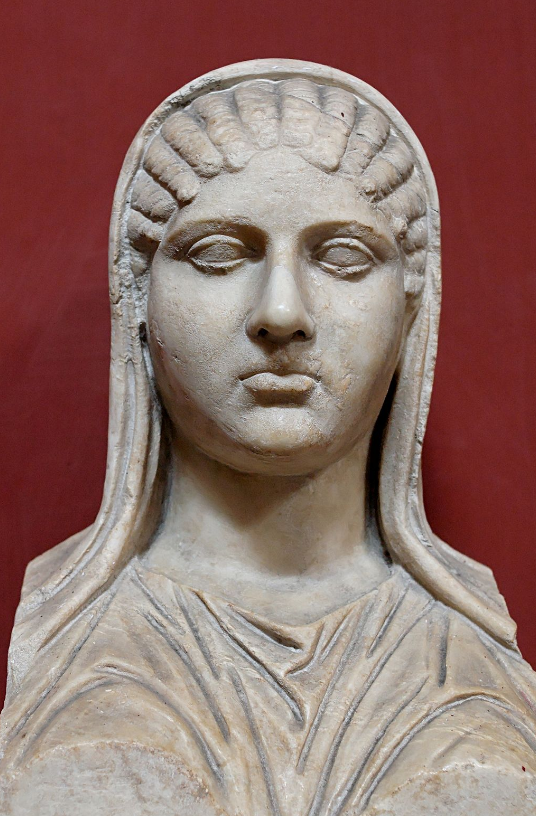The Influence of Aspasia
Aspasia on the Pnyx by Henry Holiday (1839–1927). Camden Local Studies and Archives Centre.
“Socrates learnt the art of love from a clever woman” - Plato
This quote from Plato displays a fundamental problem with the mainstream study of the ancient world. Historically, Classicists have tended to fall into a pattern of studying the great men of the period and disregarding the women who influenced and supported them, and whilst this is an issue that is receiving more attention today than ever before it remains a common problem.
The issue is that the viewpoint of ancient historians who live(d) in a patriarchal society results in some disregarding the role of the women and often being outright derogatory towards powerful women of the period, causing them to be seen in a negative light.
However, when looking more closely at the issue there are hundreds of examples that could be studied as strong women of the ancient world who managed to hold great power and influence despite the prejudices of the period that were held against them.
One such woman is Aspasia of Miletus: the living muse and consort of Pericles.
Very little is known about Aspasia’s early life but it is generally accepted that she was born no earlier than 470 BCE in Miletus, an Ionian Greek city. This credits her with an even greater success, since not only was she an influential woman in Athens - which is well-known for its limitations in the rights of women - but she was also a non-Athenian. She would have been subject to prejudice for her foreign status but still she managed to influence in the lives of many important Athenians of the period - the most prominent being Pericles, the Greek statesman and general during the golden age of Athens.
It is speculated that Aspasia was so central to his success that she actually wrote Pericles's famous funeral oration. This speculation comes from a line in Plato’s Menexenus where he jokes about Aspasia having written the speech, and whilst this is generally not taken seriously it is worth further attention since the humour of the joke is only apparent for two possible reasons.
The first of these is that this joke is a slight at Pericles about not writing his own speeches - in which case this actually credits Aspasia with the creation of the great work; the second is that this joke is a slight at both of them - Pericles's speech is so bad because a woman had written it.
The second of these does not seem to be particularly likely in the context since earlier in the conversation Socrates credits Aspasia as being his teacher, and we can infer that this is an environment where Aspasia is respected, which increases the likelihood that the former is true.
Aspasia's role in the growth of Philosophy during this period cannot be denied since Socrates - who is seen by some as the father of western philosophy - credits her as one of his teachers.
There is possibly further evidence of her great role in Greek philosophy, however. There exists a theory propounded by Armand D’angour in his biography of Socrates which suggests that Aspasia could be the inspiration behind another significant person in the life of the philosopher, Diotima of Mantinea. Diotima appears in Plato's Symposium, and while she may have been fictitious, she may also have been based on a real person.
This is a particularly resonant theory since Aspasia appears to have had very similar personality traits to Diotima and should this theory be proved true it is eminently clear that Aspasia was an amazing thinker and philosopher and should receive more credit. It also says a lot for her intelligence that this is even considered a possibility since it shows the mark that she made upon Socrates was significant enough to be seen as a significant influence in society.
Aspasia receives a lot of criticism for her role in the Athenian war with Megara, as it is alleged that this war was caused by her influence over Pericles. It has been claimed by some sources - such as Aristophanes and Plutarch - that the war was started mainly due to a personal grudge caused by the rape of two prostitutes who allegedly belonged to Aspasia in retaliation for the rape of a Megarian prostitute by some Athenian men.
Bust of Aspasia, identified through an inscription. Marble, Roman copy after an Hellenistic original. From Torre della Chiarrucia (Castrum Novum) near Civitavecchia.
However the main source of these accusations comes from Aristophanes who was very much anti-empire and therefore would have been extremely critical of Pericles and Aspasia.
As a playwright, Aristophanes would have been more concerned with being entertaining in his writing than being factual and accurate. Whilst Aspasia’s influence in the war is also brought up by Plutarch, it is important to consider that Plutarch wrote his history a long time after the events and may have used Aristophanes as a source.
Even if Aspasia had influenced Pericles in this way, it would still be a remarkable feat for a woman in Athens during this period. It perhaps reflects on society today that many more modern women such as Michelle Obama and, more controversially, Meghan Markle have held a lot of power and influence over their powerful male counterparts, and influenced their decisions. Aspasia therefore demonstrates a monumental way that women have managed to be influential through history.
Last-minute exile: Ashleigh Hamilton
Hometown: Blackpool
High School: Baines
Graduation/ leaving year: 2021
Like Seneca, like Aristotle and like countless others from Classical history, you find yourself subject to an exile order, and must vacate the country tout-suite before some sort of sword-based injury befalls your neck!
You grab three records…
Magic Flute (Mozart)
Iolanthe (Gilbert and Sullivan)
Carmen (Bizet)
…two books…
The Iliad (Homer)
Metamorphosis (Ovid)
…a Tupperware of your favourite food…
Chocolate cake
…and something else at random.
My charm bracelet
Exile is going to suck, but at least you won’t have to put up with…
Bad weather



